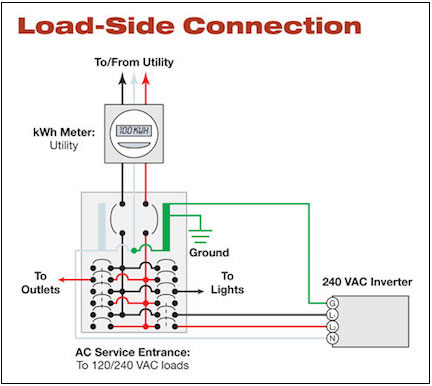Here is the meter currently in place for all the non-solar installations around here. The two blacked out areas just cover serial numbers . They are not screens.

Last edited:
You have to do more research or take a look at your contract. Like I mentioned earlier, solar panels are not powering your home. They are not both connected to your home and the grid. They are only connected to the grid. They do not work by "powering" your home and then sending the excess, if there is any, to the grid.
Like others mentioned, with one meter, that is simply done by reversing the meter. This is the best deal because you are deducted a kwh for each kwh produced and sent back to the grid. None of that is sent to your home though.
With two meters, it's just a simple calculation, they look at how many kwh you used vs how many you produced and give you credit for the kwh produced.
Perhaps your contract is different, you may be getting each kwh you produced back for each kwh used and then if there is any excess, you get paid $0.10 per kwh. It could be this way I guess. In which case that's a pretty good deal.
The contracts I was looking at paid for ALL kwh produced a certain amount which then was credited to the bill.
And that's exactly what's happening in California with NEM3 where they pay the value of the power, not retail. That's around $0.04/kWh now.That assumes that the power company will buy the power back at $0.29 for the next ten years. Unless the contract specifically locks in this rate, it is almost a 100% guarantee that the rate will get lower and lower as more rooftop solar installations come on line.
This is that little dirty detail that is not discussed with the buyers.
Yeah, that's typical net metering with no battery, grid-tie with the inverter feeding the panel. If the panels can cover your consumption+, then you are both back feeding the grid and covering your own use. Any deficit will change the direction of the meter and the you'll be drawing grid power to supplement.Here is a schematic on how it works for us up here. Not saying its how its done anywhere else. Enjoy.
View attachment 145447

Yes, that’s part of the deal. If folks want solar during storms, good luck to them. A battery system and isolation switch is required.Yeah, that's typical net metering with no battery, grid-tie with the inverter feeding the panel. If the panels can cover your consumption+, then you are both back feeding the grid and covering your own use. Any deficit will change the direction of the meter and the you'll be drawing grid power to supplement.
With these systems, as a safety feature, if the inverter loses grid power, you have zero electricity. It cannot island and just run your house from the inverter and panels, a battery bank system and an isolation/transfer switch (like for a generator) is required for this function.

Nice schmatic. All I know is what I pay. And I pay peanuts. All good.Here is a schematic on how it works for us up here. Not saying its how its done anywhere else. Enjoy.
View attachment 145447
Now, now, Jeff, you pre-paid for all this power years ago, but having said that you must be closing in on your pay out time.Nice schmatic. All I know is what I pay. And I pay peanuts. All good.
Loop on Month
PG&E ---> Bill ---> Me ---> $9 ---> PG&E
Repeat
Well, you may have heard CA energy costs are a little on the expensive side...Now, now, Jeff, you pre-paid for all this power years ago, but having said that you must be closing in on your pay out time.
